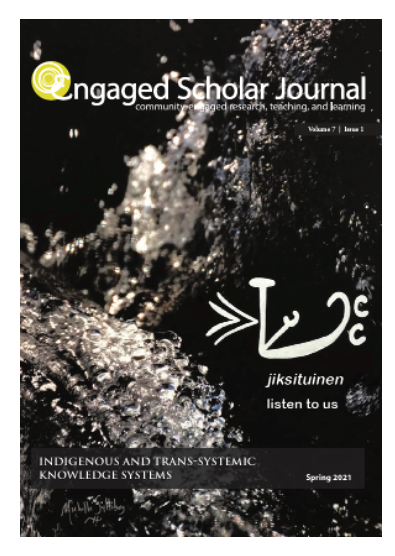Generative Learning and the Making of Ethical Space: Indigenizing Forest School Teacher Training in Wabanakik
DOI:
https://doi.org/10.15402/esj.v7i1.70065Keywords:
Indigenous, land-based pedagogy, community-driven, Indigenize, training, ethical space, generative learningAbstract
This reflection on community-driven research in process is written from the perspective of graduate student co-researchers collaborating with Wabanaki community co-researchers on a pilot project involving a Wabanaki and a non-Indigenous organization. Three Nations Education Group Inc. (TNEGI) represents three Wabanaki schools and communities in Northeast Turtle Island. The Child and Nature Alliance of Canada (CNAC) offers a Forest and Nature School Practitioner Course (FNSPC) for educators seeking to operate forest schools. These diverse organizations have developed a pilot FNSPC training for a group of TNEGI educators, with the purpose of Indigenizing the FNSPC. This is necessary to address the Eurocentric forest and nature school practices in Canada, which often fail to recognize the herstories, presence, rights, and diversity of Indigenous Peoples and places. TNEGI educators envision a land-based pedagogy that centers Wabanaki perspectives and merges Indigenous and Western knowledges. In the FNSPC pilot, the co-researchers generated course changes as they progressed through the pilot, decolonizing the content and format as they went. Developing this Indigenized version of the FNSPC will have far-reaching implications for the CNAC Forest School ethos and teacher training delivery. This essay maps our collaborative efforts thus far in creating an ethical research space within this Indigenous/non-Indigenous research initiative and lays out intentions for the road ahead.
References
Ashton, E. (2015). Troubling settlerness in early childhood curriculum development. In V. Pacini-Ketchabaw & A. Taylor (Eds.), Unsettling the colonial places and spaces of early childhood education (pp. 81-97). Routledge.
Ball, J., & Pence, A. (2006). Supporting Indigenous children’s development: Community-university partnerships. UBC Press.
Battiste, M. (2013). Decolonizing education, nourishing the learning Spirit. UBC Press.
Battiste, M., & Henderson, J. Y. (2019). Indigenous and trans-systemic knowledge systems.
Retrieved from https://esj.usask.ca/index.php/esj/announcement/view/371
Cajete, G. (1994). Look to the mountain: An ecology of Indigenous education. Kivaki Press.
Calderon, D. (2014). Speaking back to manifest destinies: A land education-based approach to
critical curriculum inquiry. Environmental Education Research, 20(1), 24-36.
Castleden, H., Morgan, V. S. & Lamb, C. (2012). “I spent the first year drinking tea”: Exploring Canadian university researchers’ perspectives on community-based research involving Indigenous Peoples. The Canadian Geographer, 56(2), 160-179. https://doi.org/10.1111/j.1541-0064.2012.00432.x
Child and Nature Alliance of Canada (2014). Forest and Nature School in Canada: A Head,
Heart, Hands Approach to Outdoor Learning. Retrieved from
https://childnature.ca/wp-content/uploads/2017/10/FSC-Guide-1.pdf
Child and Nature Alliance of Canada. (2019). Strategic Plan 2019-2024. Retrieved from http://childnature.ca/wp-content/uploads/2019/08/CNAC-2019-Strategic-Plan-14-Web.pdf
Cree, J. (2018). Forest School Association History. Retrieved from
https://www.forestschoolassociation.org/history-of-forest-school/
Cree, J., & McCree, M. (2012). A brief history of the roots of forest school in the UK. Horizons:
Professional development for outdoor practitioners, 60, 32-34.
Donald, D. (2009). The curriculum problem of Indigenousness: Colonial frontier logics,
teacher resistances, and the acknowledgment of ethical space. Brill, 23-41.
Ermine, W. (2007). The ethical space of engagement. Indigenous Law Journal, 6(1), 193-203.
FNIGC. (2020). The First Nation Principles of OCAP. Retrieved from https://fnigc.ca/ocap
Green, J. (2014). From colonialism to reconciliation through Indigenous human rights. In J.
Green (Ed.), Indivisible - Indigenous human rights (pp. 18-42). Fernwood Publishing.
Greenwood, D. A. (2011). Why place matters: Environment, culture, and education. Handbook
of Research in the Social Foundations of Education, 632-640.
Gruenewald, D. A. (2003). The best of both worlds: A critical pedagogy of place. Educational
Researcher, 32(4), 3-12.
Kimmerer, R. W. (2013). Braiding sweetgrass: Indigenous wisdom, scientific knowledge, and the teachings of plants. Milkweed Editions.
Knight, S. (2009). Forest schools and outdoor learning in the early years. Sage.
Koller, K. (2015). Towards a political economy of on-reserve Indigenous education in Canada:
Problematizing Bill C-33 [Unpublished master’s thesis]. Carleton University. https://doi.org/10.22215/etd/2015-11202
MacEachren, Z. (2013). The Canadian forest school movement. LEARNing Landscapes, 7(1),
-233.
Nxumalo, F. (2019). Decolonizing place in early childhood education. Routledge.
Robertson, J. (2008). I ur och skur. Retrieved from http://creativestarlearning.co.uk
Simpson, L. B. (2017). As we have always done: Indigenous freedom through radical resistance.
University of Minnesota Press.
Smith, L. T. (1999). Decolonizing methodologies: Research and Indigenous Peoples. Zed Books.
Taylor, A. & Pacini-Ketchabow, V. (2015). Introduction: Unsettling the colonial places and spaces of early childhood education in settler colonial societies. In V. Pacini-Ketchabaw & A. Taylor (Eds.), Unsettling the colonial places and spaces of early childhood education (pp. 1-18). Routledge.
Tuck, E., & Yang, K.W. (2012). Decolonization is not a metaphor. Decolonization:
Indigeneity, Education & Society, 1(1), 1-40.
Tuck, E., McKenzie, M., & McCoy, K. (2014). Land education: Indigenous, post-colonial, and
decolonizing perspectives on place and environmental education research. Environmental Education Research, 20(1), 1-12. https://doi.org/10.1080/13504622.2013.877708
Downloads
Published
How to Cite
Issue
Section
License
Authors who publish with this journal agree to the following terms:
- Authors retain copyright and grant the journal right of first publication with the work simultaneously licensed under a Creative Commons Attribution License CC BY 4.0 that allows others to share the work with an acknowledgement of the work's authorship and initial publication in this journal.
- Authors are able to enter separate, additional contractual agreements for the non-exclusive distribution of the journal's published version of the work (e.g., post it to an institutional repository or publish it in a book), with an acknowledgement of its initial publication in this journal.
- Authors are permitted to post their work online (e.g., in an institutional repository or on their website) after the publication of their work in the Engaged Scholar Journal.
- Please note that while every opportunity will be taken to ensure author participation in the editing process, due to time constraints final copyediting changes may be made before publication to ensure APA adherence throughout all submissions.




